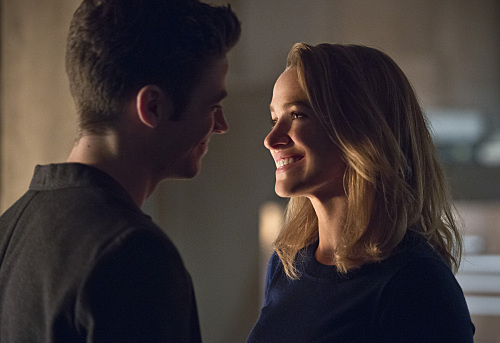Welp. We’re down seven episodes on CBS’ new Supergirl series, and I can now definitively say that not only does it suck, but it’s also a drag.
Let me clarify: TV shows can suck and still be worth watching. They can feature horrible dialogue, break characterization for cheap plotlines, deploy so many reversals that situations and relationships become meaningless, flub the acting, swell the dime-store music, and commit any number of fundamental visual storytelling sins… while still being hella fun to watch.

Take Supergirl’s DC TV older brother Arrow, for example. In its first two seasons, Arrow committed every one of the above-named TV crimes — and more — but still delivered solid entertainment in the form of: 1.) consistent mood, 2.) consistent naked man abs, 3.) consistently competent-to-good fight choreography and, 4.) consistently fun/dangerous villains. They knew their audience, provided the four basic food groups, and gave themselves three and a half seasons to catch up on the other elements (many of which have been improving, sometimes dramatically.)
In other words, Arrow has always prioritized fun, even over good storytelling.

Middle child The Flash has benefited from Arrow’s learning curve. The Flash’s mood is also consistent — if different from Arrow’s — and it provides consistently good fight scenes and villains, like Arrow (with the deep exception of Grodd — what were they thinking there?). But instead of the dark-mood/man-candy vibe, The Flash serves its audience by orienting its plotlines around the central relationships in the show, rather than the other way around, which naturally results in better, more consistent characterization. So The Flash is equally fun, and better written.
I’d also put in here that The Flash is closer to the “chick flick” end of the entertainment spectrum, in the sense of focusing more on romantic relationships. One of Barry’s central conflicts in the first season was his unrequited love for Iris, and the stakes in the season finale were carefully built around layers of this relationship and others. Arrow, on the other hand, hasn’t prioritized romantic relationships at all until this season — in the sense that the flow of plotlines doesn’t distort around them — so it really exists on the other, more “masculinized” end of the spectrum, where chop-socky, musculature, and moral posing are the magnets that turn the narrative arcs.

I mention chick flicks because everyone noticed how the extended Supergirl trailer positioned Supergirl as a chick flick-esque character with superpowers, and that was one of the concerns going in to the show. Sadly, Supergirl does not hew to that model of storytelling: “sadly” because it’s a model that might work for Supergirl in the same way that it worked for the first season of The Flash. But instead of a chick flick with muscles, or a Flashian world that centers relationships, or an Arrowesque dark-toned-muscley Nolan-fest, or even a traditional cartoony television superhero show, we’re getting a mash-up of half-baked tropes and visual storytelling failures — all the sins tallied above — with none of the virtues of pure, simple entertainment.
In short: Supergirl doesn’t bring the fun.

First, Supergirl/Kara Danvers, as a character, is a drag. She is relentlessly bland, and not in Arrow Steven Amell’s moderately attractive, half-naked, oh-I-was-tortured way. (A friend-of-a-friend called it “blangst” in an FB thread). Supergirl’s angst has essentially only one source: the disdain and disrespect with which she is treated by everyone around her: her family, her supporting team, her detractors, every single villain, and even her media supporters. As such sad-Supergirl has all the emotional power of a tween failing to get a baking powder volcano to overflow. The actress, Melissa Benoist, has only two expressions: puzzled and golden retriever; her lack of actual personality overcomes her physical beauty at every turn. Ironically, Benoist has a certain charisma that could turn into gravitas if they stopped stymieing her character; but for now, it’s only expressed in occasional dazzling smiles.
Second, Supergirl’s adopted sister Alex Danvers is a drag. Chyler Leigh is a wretched choice for the badass, disapproving older sister: she’s cast against type, and is prettier, girlier, and more individual than Wonder Bre– I mean Supergirl. She would have been great as Kara Danvers’ flaky, boy-crazy best friend, and the show would have been a thousand times more entertaining — if also cringe-inducing. But even if they’d cast a more appropriate Alex Danvers, the character would still be a drag. Who wants a superhero story in which a frowny, disapproving older relative who cockblocks the superhero shows up in half the action scenes? Who thought this was a good idea?

The DEO is a drag. How could an overly serious, quasi-governmental organization to control alien/superpowered populations be anything but a drag? Neither of the other DC heroes is saddled with government interference, and Marvel’s S.H.I.E.L.D.-focused TV show was focused on the organization, not the superheroes it was controlling. And that only worked once they had S.H.I.E.L.D. thoroughly compromised by the bad guys. (Remember how draggy it was until Ward went all Darth Vader?) In fact, the Marvel individual hero movies mostly relegated S.H.I.E.L.D. to the sidelines because it was too much of a drag to have them front and center in an individual hero’s journey.
I suppose there could have been ways to make the DEO more interesting — and perhaps they’ll be explored later in the show, but as of now, the organization is a big, fat echo of Alex Danvers: dour, dark, forbidding, disapproving, and endlessly cockblocking. Where’s the joy in that? 95% of the fun in a superhero’s origin story is the hero exploring their powers on their own, breaking up criminal acts in dark alleyways, experimenting with movement and strength, building instant relationships with the people they save. Mediating Kara’s entire experience through an ugly (design-wise — polo shirts, people?) organization with a buzzkill attitude saps all the joy out of her self-discovery.

And why is it the first standalone female superhero who gets a chaperone? Superman told the government to go fuck itself (politely). Flash and Arrow work in the shadows parallel to, and often against, officialdom. Why does Supergirl have to be controlled? The Flash and Arrow got their own backup teams, dedicated to them, and not to some broader purpose they were expected to assist in. Why is it Supergirl who is just another — albeit more powerful — adjunct in the DEO’s not-Supergirl-oriented worldview?
Supergirl does, in fact, put together her own team, made up of Winn and Jimmy Olsen. But they don’t get to do anything (because DEO) and they’re also a drag. Winn’s entire character is unrequited hots for Kara. I don’t know how “friendzone” is a character arc. And Jimmy’s (I refuse to call him “James”) whole raison d’etre is trying to separate himself from Superman so he can have his own identity and accomplishments. So how is joining Kara’s team gonna do that for him, exactly? Kara’s relationship with Jimmy is Blandy McBlanderson because Jimmy’s merely a good-looking exterior with a negative drive: he only knows what he doesn’t want.
I appreciate the complete failure to objectify Benoit’s body, but did they have to do it at the expense of her entire sex appeal? She could be made “sexy” (as in: edgily appealing) through her fighting style, but they inexplicably left her character with no fighting skills whatsoever. So the fight choreography is non-existent, and the fight scenes are terribly awkward and dull, which is a huge drag. I’m squirmily ambivalent about the values displayed by fetishizing and stylizing violence in all of our hero stories, but the solution to that is not to make the fights boring, ferchrissake. Supergirl is clearly not struggling with this issue as a moral one; it’s obviously an intersection of poor conceptualization and poor direction.

Which brings us back to the question of what kind of story Supergirl is supposed to be telling. The show currently has no fucking clue. The Flash and Arrow are both very clear on what kinds of shows they’re supposed to be, which is why all the good times. But Supergirl seems to be operating on the spaghetti test principle: throwing in rapid succession rom-com, coming-of-age, family dysfunction drama, spy thriller, comic book, sci-fi, and, strangely enough, teen sit-com at the wall until something sticks. And, although I objected at the time to a super-chick-flick Supergirl, that seems to be the only way to save this mess.
The chick flick model could work well for the sole reason that Cat Grant, as a modified Devil in Prada, is hands down the most complex and interesting — not to mention fun — character in the show. In fact, to me, she’s the breakout character of all three DC comics shows — and even has one over Meryl Streep’s Miranda Priestly, who is a stereotype of frigid female power only rescued by Streep’s performance.
Cat Grant — expertly embodied in a Calista Flockhart ravaged by decades of Hollywood dieting — is a deeply self-absorbed, media-manipulative, borderline abusive boss, who genuinely cares for her sensitive son, is genuinely hurt by the disdain of her intellectually powerful mother, and turns out to be a great mentor and supporter of both Supergirl and her downtrodden, personal assistant alter-ego. Flockhart deserves an Emmy for realizing that she has to play Grant’s flaws cartoonishly, but her human traits realistically (if broadly). Grant thereby acts as the sole effective bridge between the comic-book aspects of the show, and real-world characterization and relationship-building.

Committing to the virtues of the best chick-flicks doesn’t mean losing the virtues of a superhero tale. It just means that women’s concerns and relationships — women’s approaches to danger, power, life, and love — are centered and drive the plot; not men’s. Reversing the most absurd and damaging aspect of Supergirl, Superman’s failure to appear, could save the whole show. Superman’s bizarre absence maintains him as an invisible patriarchal standard that Supergirl can never live up to. The show’s premise — that Kara is the elder cousin sent to Earth to raise Kal-El, who through an accident finds herself the younger dependent — opens up a world of interesting issues, if they would only allow Superman to be an actual character on the show, rather than a looming god/measuring-stick.
I have a fantasy of Supergirl calling Superman by a childhood nickname she made up when she was babysitting him; Kara explaining the origin of his one scar, something he couldn’t have gotten on Earth; Kara noticing that he has his father’s hand gesture, his mother’s smile, their grandfather’s air; Supergirl flying alongside him, telling him naughty stories about their alcoholic great-aunt, etc.
I have a fantasy of Supergirl being a character with the knowledge, authority, and love to hold her own against the incredible weight of Superman and all the male superheroes out there. I have a fantasy of Supergirl being more than a whiny drag. But I’m not holding my breath.